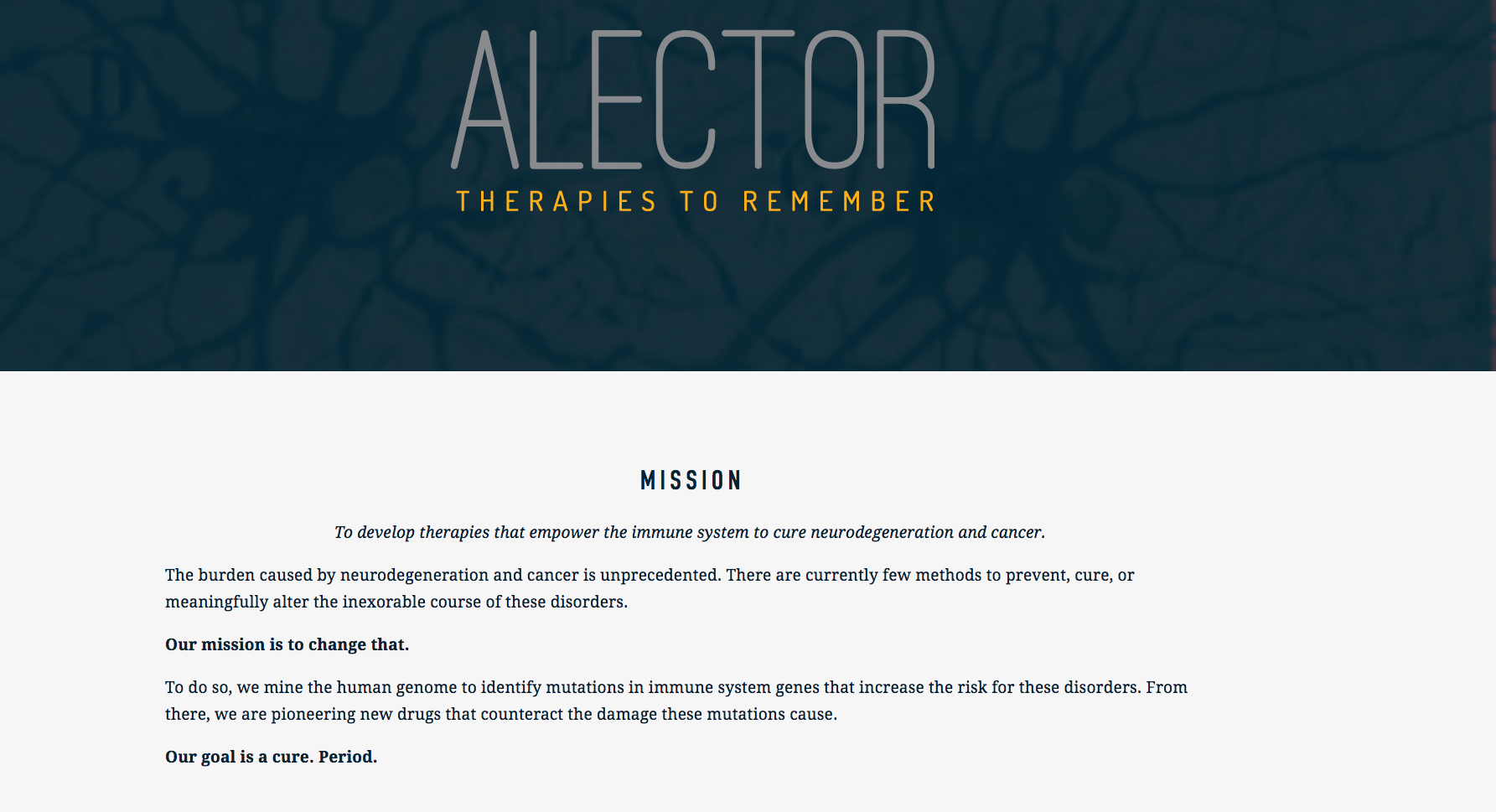



Get new exclusive access to healthcare business reports & breaking news




On Wednesday, Alector, a startup that focuses on developing new treatments for Alzheimer’s disease, announced it raised $133 million after a Series E funding round. As part of the new round of funding, Abbie gets the right to develop and sell two of the drugs Alector is currently working on should they become commercially viable.
Some of the companies participating in this round of funding include Deerfield Management, AbbVie Ventures, Federated Kaufmann Fund, Section 32, Euclidean Capital, Foresite Capital, Lilly Asia Ventures, New Leaf Venture Partners, Perceptive Advisors, Casdin Capital, Polaris Partners, OrbiMed, MRL Ventures, GV, the Dementia Discovery Fund, Mission Bay Capital, Amgen Ventures.
Based in the Bay Area, Alector focuses on developing immunotherapy treatments to battle neurodegenerative diseases, with Alzheimer’s and dementia being their focus area. The company also conducts research on treating various types of cancer.
This is the second round of funding for Alector in less than one year. After receiving $225 million last October, Alector announced that its Alzheimer’s research was still in early stages, but the company expects to make significant progress over the next two years.
The company’s goals after the recent round of funding was completed is to push five targeted drugs into human trials. From these five, the plan is to work on treatment targeting Alzheimer’s and frontotemporal dementia first.
The most prevalent symptoms of Alzheimer’s disease (AD) are extreme memory loss, incapacity of rational thinking and major behavioral changes.
The disease is virtually impossible to treat & prevent because symptoms usually develop over a long period of time, at first appearing in ways that are easy to overlook, especially since forgetting is typical at a certain age.
Diagnosing Alzheimer’s is difficult in early stages, and symptoms slowly worsen, until they become so severe, they make daily tasks impossible to perform.
As the disease advances, individuals not only cease to recognize friends and family members but also undergo complete personality changes, as their entire behavioral model alters beyond recognition.
Alector’s focus on Alzeimer’s is poised to attract big funding from pharma and biotech companies. After all, Alzheimer’s is the most common form of dementia, accounting for 60% to 80% of all dementia cases.
Frontotemporal dementia (FTD) is another form of dementia for which Alector is developing drugs. FTD refers to certain disorders which appear due to a progressive deterioration of nerve cells located in the brain’s frontal and temporal lobes.
Seven years ago, there were over 20 million people living with advanced dementia worldwide (Ballard et al, 2011), but numbers are going up. Since baby boomers are now starting to reach the age when AD typically makes its debut, the need to find treatments becomes ever more urgent.
Numbers of AD patients are expected to double by 2050 (Hebert et al, 2003), making Alector’s focus on finding a cure timely and much needed given what’s at stake.
“There has been a lack of new approaches to treat the underlying causes of devastating neurodegenerative diseases such as frontotemporal dementia (FTD) and Alzheimer’s disease,” said Sabah Oney, Alector’s Chief Business Officer. She added that Alector concentrates its efforts on obtaining progress in finding advanced, innovative treatments for these serious afflictions.
“We are thrilled to have strong support from industry-leading investors, and this financing ensures sufficient resources for the continued development of our novel drug pipeline”, Oney concluded.


Alector is trying to enroll the body’s immune system in fighting Alzheimer’s, area of medical expertise is gradually becoming known as immuno-oncology. This approach has also previously proven successful in battling some forms of cancer.
Of the five drugs Alector is trying to develop, two candidates are focused on AD and one on FTD. Two receptors, each connected with myeloid cells, are targeted by the first two drugs. One is a triggering receptor, called TREM2. The other one, SIGLEC-3, is a transmembrane receptor. Mutations of each of these receptors have been proven to favor Alzheimer’s onset and progression.
The other drug candidate targets frontotemporal dementia (FTD). Although a rarer type of dementia, as the Association for Frontotemporal Degeneration explains, it mostly affects those under the age of 60. The usual age of onset for this disease is between 45 and 64.
The drugs Alector is trying to get to human trials are supposed to rejuvenate the human brain, thus preventing the cell degradation that eventually leads to AD or FTD onset. “So what our drugs are doing, they are basically rejuvenating, strengthening, and inhabiting the immune cells to function better”, Alector’s cofounder and CEO Arnon Rosenthal explains.
The new funding will, among other tasks, pay to bring these drugs into Phase I clinical human trials. As we reported before, it costs 1.3 billion dollars to take a drug through the R&D phase and the FDA approval phase.
Wednesday’s funding announcement was a real gulp of fresh air and hope for all those afflicted by dementia and their families.
Recently, Verge Genomics also received $32 million to automate the drug discovery process for Alzheimer’s and other life threatening conditions. Dementia is becoming a major focus for healthcare professionals all over the world. Nowadays there are even dementia simulators currently available for medical students to really understand how it feels to be in the shoes of a patient suffering from this condition.